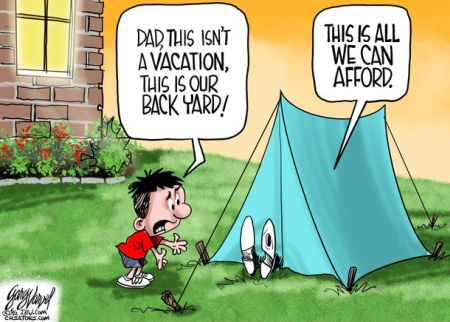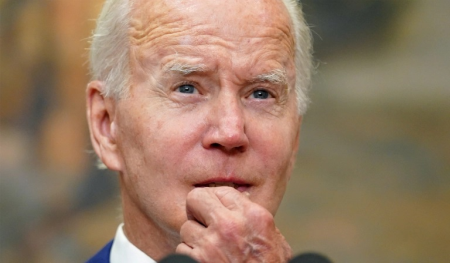By next year, inflation will likely be so unpopular that Americans from the far left to the far right will demand that Congress do something.
By Kevin Hassett
Back when he was in the White House, Bill Clinton famously advised Monica Lewinsky that there was no evidence, so she should “deny, deny, deny” that anything happened between them. But as we all know now, there actually was evidence.
Taking a page out of the Clinton playbook, Joe Biden’s strategy has been to “deny, deny, deny” that there is any link between his policies and inflation – even going so far as to assert that the notion of a link is “bizarre.”
 But just as was the case in Bill Clinton's denial, there's also actual evidence that confirms Mr. Biden's – and the Democrat's policies – have lead to and increased inflation.
But just as was the case in Bill Clinton's denial, there's also actual evidence that confirms Mr. Biden's – and the Democrat's policies – have lead to and increased inflation.To point out one study, economists at the San Francisco Fed concluded that core inflation would still be around 2% if the U.S. had not provided so much “fiscal support.”
And, it should not be any surprise to the Biden White House that there are studies documenting such findings.
There are many ways to describe the economic relationship, but here is the simplest. (If you happen to have any friends in the White House, you might want to email them the following paragraph.)
Suppose that everybody in the economy has 10% more money to spend on things this year than they did last year. If suppliers can produce 10% more supply than they did last year, then prices can stay the same. If suppliers can’t produce any more than they did last year, then prices will go up 10%. Where you end up between those two points depends on how much supply can keep up with demand.
Why might everyone have more money to spend on things? There are two big ways it can happen.
First, the Fed can print money and hand it out to people so everyone has more cash in their pockets.
Second, the government can mail checks to people.
Since the Biden Administration’s policy has been to mail checks to people, the first section of the road to inflation is paved.
Second, the government can mail checks to people.
Since the Biden Administration’s policy has been to mail checks to people, the first section of the road to inflation is paved.
 True, supply could have possibly kept up with the higher demand that this created, but when checks were mailed, Biden was attacking supply with higher regulation, higher taxes, and even, as has been the case this week with oil companies, demonization.
True, supply could have possibly kept up with the higher demand that this created, but when checks were mailed, Biden was attacking supply with higher regulation, higher taxes, and even, as has been the case this week with oil companies, demonization.The result has been to complete the route all the way to 10% inflation.
Using the same irrefutable logic, it is simple to implement fiscal policies that reduce inflation.
On the demand side, the government can have a large immediate effect on aggregate demand if it stops spending money and reduces the monies it transfers to citizens. The latest CBO outlook calls for a trillion-dollar deficit this year, and $14.5 trillion of deficit spending over the next ten years. A sharp reduction in both of those numbers would reduce aggregate demand and make it easier for supply to keep up with it.
But the flip side of the coin must be supply-side policies. Currently, the most important supply side part of the Trump tax cuts – namely the expensing of capital equipment – will begin to expire next year. If Congress made expensing permanent, those thinking about capacity expansion might convince themselves to ignore the rest of President Biden’s anticapitalist nonsense.
If deficit reduction is taken seriously on the spending side, then supply-side cuts could go even further – with a cut in the tax rate paid by small businesses, a reduction in the corporate rate, and a reduction in income tax rates all contributing to increased capital formation and increased labor-force participation.
A blossoming of supply would end the inflationary spiral.
There is little chance that the party holding power today would adopt such policies, which means that, for now, the Fed must go it alone.
With the enormous deficit, fiscal policy is pushing inflation in the wrong direction, so monetary policy will have to be much tighter than it would otherwise be if inflation is to be reversed. And while higher interest rates reduce demand for things like houses and cars, they also reduce incentives to create supply.
Having the Fed go it alone is a recipe for failure – and deep, deep recession.
 Expect growth to be terrible and inflation to rise still further until policy-makers wise up.
Expect growth to be terrible and inflation to rise still further until policy-makers wise up.
By next year, inflation will likely be so unpopular that Americans from the far left to the far right will demand that Congress do something about it.
 Expect growth to be terrible and inflation to rise still further until policy-makers wise up.
Expect growth to be terrible and inflation to rise still further until policy-makers wise up.By next year, inflation will likely be so unpopular that Americans from the far left to the far right will demand that Congress do something about it.
If the Republicans regain some political power in Congress, an inflation-fighting bill will have to be their top priority. The bad news is that they will inherit a mess.
The good news is, that it won’t take rocket science to fix things – just a common-sense understanding of supply and demand, and a modicum of political courage.
Kevin Hassett is a distinguished visiting fellow at the Hoover Institution and the global head of research at Affinity Partners. He served as the 29th Chairman of the President’s Council of Economic Advisers beginning in 2017, and rejoined the White House in 2020 as Senior Adviser to the President.
























